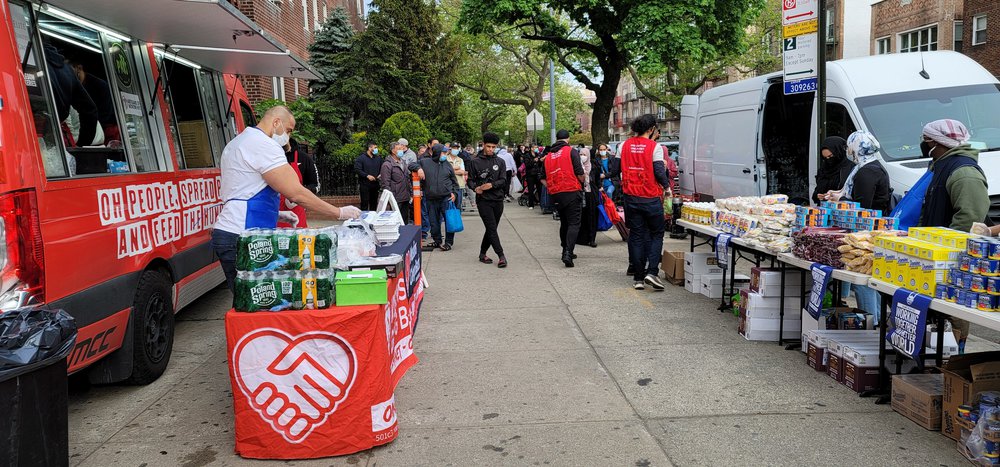Muslim Charity Spends Holy Month Feeding The Homeless Every Night
May 13, 2021, 5:36 p.m.
Volunteers with Muslims Giving Back have met hundreds of homeless and low-income communities in the streets to hand out hot meals and other necessities every night during Ramadan.

For the past month, over 150 hot meals have been handed out to the public in Manhattan’s Herald Square on a nightly basis.
But it’s not the city’s doing.
Rather, the meals are being cooked and prepared at a mosque in Sunset Park as part of an initiative for Muslims Giving Back [MGB], a volunteer-run food bank and community assistance charity catering to homeless, immigrant and low-income New Yorkers.
“We are here to tackle food insecurity,” Mohammed Widdi, a 32-year-old Palestinian American from Brooklyn and coordinator with MGB, said. “And we're firm believers in faith to action and we're all about adding value to people's lives.”
While the giveaways have been taking place at 11:00pm in Herald Square every Friday and Saturday for the past few years, volunteers have ramped up their efforts during the holy month of Ramadan to make it a daily affair which is scheduled to end Thursday night with the celebration of Eid al Fitr, the “Festival of Breaking the Fast.”
So every night during Ramadan, a month of prayer, fasting, and reflection, Widdi has been driving a food truck full of halal meals across the Brooklyn Bridge to midtown Manhattan with the logo “Muslims Giving Back” proudly emblazoned on the side. Already waiting are not only the hundreds of people looking for kindness and a meal, but several dozen volunteers associated with the organization setting up tables, passing around tea and hot chocolate, and forming people into orderly lines.
Along with hot meals, the organization also offers hygiene kits, haircuts, clothes, shoes, and other amenities to whoever needs it.
Other organizations across New York also provide free meals to those who visit, but MGB has remained one of the few charities who bring meals directly to the streets for those who need it.
“We typically distribute 150 meals a night, but there are many nights where we do 300 meals and plus some,” Widdi said. “But it does fluctuate, especially during coronavirus. We're actually one of the only organizations out here handing out food and the line used to be wrapped around the block.”

One reason why the organization has been able to meet the increased demand inflicted by the pandemic has been due to their robust network of volunteers.
While other food banks across the city have been calling for more helpers, MGB has been successful in attracting so many volunteers and donations partly because their mission to change the negative narrative against Islam has resonated with young Muslim Americans across the city, many of whom have experienced discrimination post-9/11.
“Islam is not what the media portrays,” Widdi said. “At the end of the day it’s super important to show what Islam truly is, and that’s why we’re out here: the obligation is on us.”
These sorts of shared experiences helped build the organization, where now the MGB Facebook group has grown to 30,000 active supporters, with at least five NYC schools creating their own branch of Muslims Giving Back.
But the pandemic has made the work of volunteer-run organizations like Muslims Giving Back much more challenging.
“The only time we do our annual fundraiser is during Ramadan which we do here at the mosque where we raise money to cover a couple months of expenses,” Mohammed Bahe, the director of MGB and the MCC, the mosque where the charity is based, said. “[Last year] there was no Ramadan, so we had to do everything online.”
Tax filings in 2019 show that the charity raised more than $160,000 in revenue. Last year the charity raised just under $100,000, according to Bahe.
“We have a 100% donation policy,” Bahe said. “A dollar comes in, and a dollar goes out to the cost of the project.”
Yet the volunteers at MGB are not ones to be deterred. In the past year, meal distribution has expanded to other parts of the city to include parts of Harlem, Queens, and Brooklyn’s Sunset Park.
In fact, all the hard work in raising awareness to end food insecurity in the city through the power of faith led the organization to purchase their second food truck just this week.
“Charity is more done for us,” Widdi said. “So, when we hand someone food, we don't expect a thank you from them. We tell them thank you.”
Joseph Gedeon reported this story for the Gothamist/WNYC’s Race & Justice Unit. If you have a tip, some data, or a story idea, email reporter Joseph Gedeon at jgedeon@wnyc.org or DM him on Twitter @JGedeon1. You can also text him tips via the encrypted phone app Signal, or otherwise, at 929-351-5374.